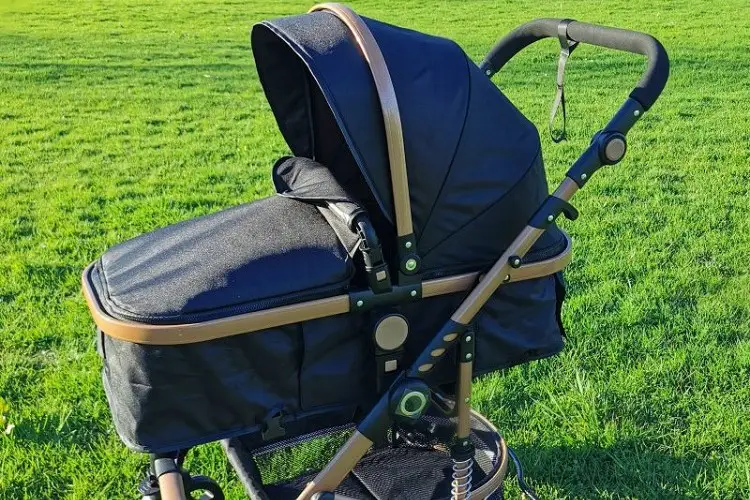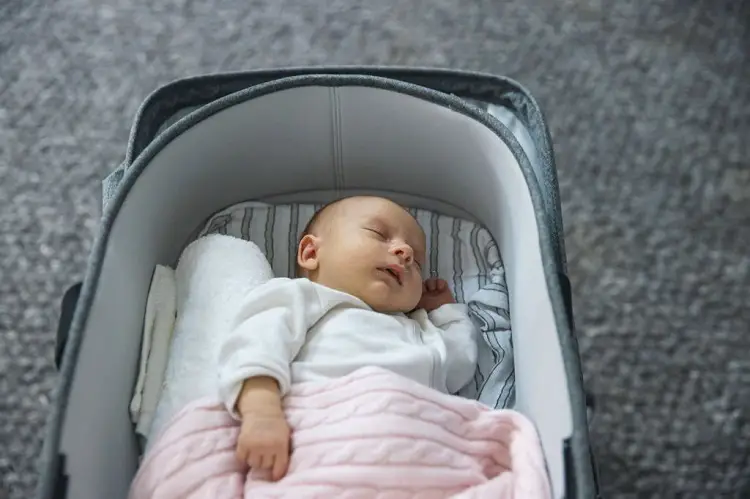Parenthood has been made so much easier with new baby gears made available to help parents care for their newborns effectively while still carrying on with other things.
A stroller is one of such gears, and it comes with other attachments like a bassinet to make it even better.
Do I need bassinet for stroller? This is a typical question any parent that wants to use a stroller would ask.
Read on; this article will help you understand better what a bassinet is and why it is essential.
What is a Bassinet?
A bassinet is a mini crib that a baby can lay down flat in. It is lightweight and can be carried about easily.
A bassinet does the work a baby crib does, only that it does not support long hours of sleep because of the limited space compared to a crib.
Do I Need Bassinet for Stroller?
The answer to this question typically depends on the situation. You may already have a crib at home and wonder about the fundamental importance of getting a bassinet since its function is almost the same.
Unless you’re working on a tight budget and cannot afford to throw money at specific things you can do without, a bassinet is an excellent gear to invest in for your baby’s safety and comfort.
It is not a necessity, but it is beneficial when you think of taking your baby on a walk in his stroller most safely and comfortably possible.
In their early months, babies are delicate beings with very fragile bodies. If placed in specific positions that do not support their fragility, they may cramp in some body parts or suffer from SCIDS.
According to child care experts, the best position to place a baby is flat on its back. This position reduces the chances of choking in their sleep or dislocating their neck or limbs.
Using a bassinet in a stroller is a good way of ensuring that your baby is lying flat while you both enjoy your stroll around the park.
Many new parents who may not appreciate long walks will not understand the need for a stroller, let alone a bassinet attachment.
If they should eventually get a stroller, they may ask, Do I need a bassinet for a stroller? But for parents who understand that their baby’s safety and comfort are their priority right from the point of conception, know that a bassinet is as helpful to them as a stroller.
And while you work in the office or do other things around the house, you can rest assured that your baby is safe and sound in a cozy bassinet.
Overall, it is not just about keeping your baby safe and comfortable but also making parenting easier for yourself.
Can a Baby Sleep in a Bassinet?
Yes. One of the fun things about a bassinet is that it is safe enough for your baby to sleep in.
Although it may not be as spacious as a crib, it is wide enough for your baby to sleep and freely turn on its sides while sleeping. It is a safe place for a good midday nap.
A bassinet is as safe as a crib, so all the sleeping rules are maintained.
The rules, which include that no loose blankets, clothes, toys, or pillows are placed in the crib so that your baby does not pull it over its face while sleeping, apply to sleeping in a bassinet.
Also, a bassinet is not a crib with so much space where your baby can roll from different sides and still be okay.
So to ensure your baby’s safety while napping in the bassinet, always keep an eye on him.
Benefits of a Bassinet Stroller
The Bassinet stroller is a good choice if you want a stroller model to accommodate a sleepy newborn.
- They have a large canopy that helps shield your baby from outdoor elements like sun, wind, rain, and curious strangers.
- Most models come with a bassinet attachment which helps you carry your baby from birth through the toddler years. So it is a good piece of baby gear that grows with your baby and enables you to save some cash.
- Bassinet strollers can also be a good choice for travel during the first few months since your baby will have a safe, familiar place to take a nap while you travel on public transportation or in a hotel. Before using an attachment as a baby bassinet, check the manufacturer’s instructions and talk to your pediatrician.
When to use a Bassinet Stroller

Like those you’d see at a parent’s bedside, traditional bassinets are typically meant for newborn babies or those under six months of age.
This is because bassinets are not designed to hold much weight, and if a baby can roll, wiggle, and move around, it may pose a safety hazard.
In most bassinet stroller models, the bassinet attachment will have a maximum weight or height limit, so you’ll need to adhere to the manufacturer’s recommendations and your child’s physical ability.
When your baby has graduated to sleeping in a crib at home, it’s probably best not to use the bassinet attachment while you’re away.
How Long Can a Baby Use a Bassinet?
The standard age for using a bassinet is between 3 to 6 months old because, by this time, your baby can support its head and turn its neck steadily.
But due to individual differences, some babies develop faster than others. Therefore, this is not a one-suit-all rule, but once your baby can support his head steadily, he can comfortably sit in a stroller without a bassinet.
Should I Buy a Bassinet for My Stroller?
If you’ve already gotten a stroller for your baby, you’re probably always on the go with your baby. It could be going to the park, the grocery store, or visiting family.
A stroller fits in well in any of these cases where you’d be doing a lot of walking around. Getting a stroller for your baby also suggests that you care about his comfort while walking around.
It will be even a better idea for a newborn to get a bassinet attachment alongside the stroller.
When babies are born, their spines are in the form of the letter C due to long months of staying in a curved position in their mother’s womb.
They need to be placed in certain positions that will straighten their spine, so placing them flat is the best way. Not just for the spine but also for their hip bone alignment.
A bassinet supports this lie-flat position for a baby and encourages its spine development and good bone alignment, making it a beneficial baby gear.
Differences between a Bassinet and a Crib
While you can admit that a bassinet and crib both serve the same purpose, they’re not the same, and one cannot be substituted for the other.
Here are some of the differences between the two gears.
- A bassinet is cheaper than a crib.
- A bassinet is lighter and can be moved around easily, unlike a crib, which is usually very heavy and stationary.
- A crib is more spacious and ideal for long hours of sleep, while a bassinet is not safe for sleeping overnight.
- A bassinet can only be used for a few months, while a crib is used for up to 4 years.
- A bassinet can hold up to 20 pounds, while a crib can hold up to 50 pounds.
When to Transition to a Crib
The function of a bassinet is not limited to being attached to a stroller only, as many parents use it as their baby’s nap space.
But as your baby grows, it’ll outgrow the size of the bassinet soon since the bassinet is not particularly designed to accommodate long years of usage by one baby.
On average, 6 months is when you should begin considering transitioning into a crib. Still, again due to individual differences, every baby is unique in their way and may grow differently.
Hence, all it takes for you to know when your baby has outgrown the bassinet is to look out for your baby’s size compared to the bassinet’s capacity.
Related Posts:
- How To Clean a Bassinet
- Best Double Jogging Stroller
- How To Keep Cat Out Of Bassinet
- 3 Wheel vs 4 Wheel Stroller – Which is the Best?
Conclusion
Do I need bassinet for stroller that may sound funny to those well vested in parenthood and its requirements?
Still, this is an excellent question for new parents that comes from a place of understanding that the bassinet serves the same purpose as the crib, especially if they already own a crib.
But as explained in the article, it is not safe for newborns to place them in a slant position in the stroller without a bassinet to support their spine.
